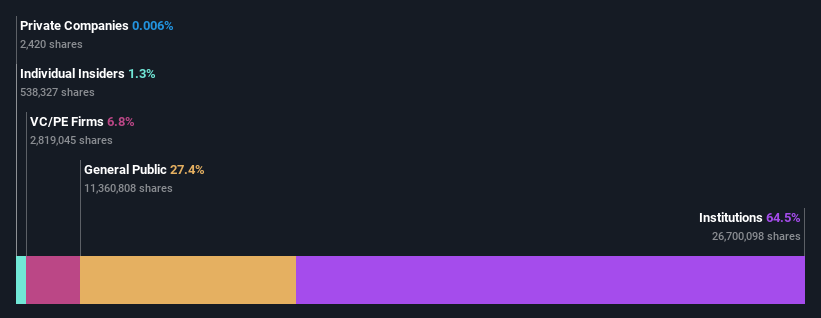An excellent week for Bicycle Therapeutics plc's (NASDAQ:BCYC) institutional owners who own 64% as one-year returns inch higher
Key Insights
Given the large stake in the stock by institutions, Bicycle Therapeutics' stock price might be vulnerable to their trading decisions
The top 14 shareholders own 51% of the company
Ownership research along with analyst forecasts data help provide a good understanding of opportunities in a stock
Every investor in Bicycle Therapeutics plc (NASDAQ:BCYC) should be aware of the most powerful shareholder groups. We can see that institutions own the lion's share in the company with 64% ownership. In other words, the group stands to gain the most (or lose the most) from their investment into the company.
And last week, institutional investors ended up benefitting the most after the company hit US$920m in market cap. The gains from last week would have further boosted the one-year return to shareholders which currently stand at 4.1%.
Let's delve deeper into each type of owner of Bicycle Therapeutics, beginning with the chart below.
See our latest analysis for Bicycle Therapeutics
What Does The Institutional Ownership Tell Us About Bicycle Therapeutics?
Many institutions measure their performance against an index that approximates the local market. So they usually pay more attention to companies that are included in major indices.
We can see that Bicycle Therapeutics does have institutional investors; and they hold a good portion of the company's stock. This can indicate that the company has a certain degree of credibility in the investment community. However, it is best to be wary of relying on the supposed validation that comes with institutional investors. They too, get it wrong sometimes. It is not uncommon to see a big share price drop if two large institutional investors try to sell out of a stock at the same time. So it is worth checking the past earnings trajectory of Bicycle Therapeutics, (below). Of course, keep in mind that there are other factors to consider, too.
Since institutional investors own more than half the issued stock, the board will likely have to pay attention to their preferences. Bicycle Therapeutics is not owned by hedge funds. The company's largest shareholder is Deep Track Capital, LP, with ownership of 6.8%. Paradigm Biocapital Advisors LP is the second largest shareholder owning 4.8% of common stock, and Jefferies Group LLC, Asset Management Arm holds about 4.7% of the company stock.
A closer look at our ownership figures suggests that the top 14 shareholders have a combined ownership of 51% implying that no single shareholder has a majority.
While studying institutional ownership for a company can add value to your research, it is also a good practice to research analyst recommendations to get a deeper understand of a stock's expected performance. There are plenty of analysts covering the stock, so it might be worth seeing what they are forecasting, too.
Insider Ownership Of Bicycle Therapeutics
While the precise definition of an insider can be subjective, almost everyone considers board members to be insiders. The company management answer to the board and the latter should represent the interests of shareholders. Notably, sometimes top-level managers are on the board themselves.
Insider ownership is positive when it signals leadership are thinking like the true owners of the company. However, high insider ownership can also give immense power to a small group within the company. This can be negative in some circumstances.
Shareholders would probably be interested to learn that insiders own shares in Bicycle Therapeutics plc. As individuals, the insiders collectively own US$12m worth of the US$920m company. This shows at least some alignment. You can click here to see if those insiders have been buying or selling.
General Public Ownership
The general public, who are usually individual investors, hold a 27% stake in Bicycle Therapeutics. While this group can't necessarily call the shots, it can certainly have a real influence on how the company is run.
Private Equity Ownership
With a stake of 6.8%, private equity firms could influence the Bicycle Therapeutics board. Some investors might be encouraged by this, since private equity are sometimes able to encourage strategies that help the market see the value in the company. Alternatively, those holders might be exiting the investment after taking it public.
Next Steps:
While it is well worth considering the different groups that own a company, there are other factors that are even more important. Like risks, for instance. Every company has them, and we've spotted 3 warning signs for Bicycle Therapeutics (of which 1 makes us a bit uncomfortable!) you should know about.
But ultimately it is the future, not the past, that will determine how well the owners of this business will do. Therefore we think it advisable to take a look at this free report showing whether analysts are predicting a brighter future.
NB: Figures in this article are calculated using data from the last twelve months, which refer to the 12-month period ending on the last date of the month the financial statement is dated. This may not be consistent with full year annual report figures.
Have feedback on this article? Concerned about the content? Get in touch with us directly. Alternatively, email editorial-team (at) simplywallst.com.
This article by Simply Wall St is general in nature. We provide commentary based on historical data and analyst forecasts only using an unbiased methodology and our articles are not intended to be financial advice. It does not constitute a recommendation to buy or sell any stock, and does not take account of your objectives, or your financial situation. We aim to bring you long-term focused analysis driven by fundamental data. Note that our analysis may not factor in the latest price-sensitive company announcements or qualitative material. Simply Wall St has no position in any stocks mentioned.

 Yahoo Finance
Yahoo Finance 

